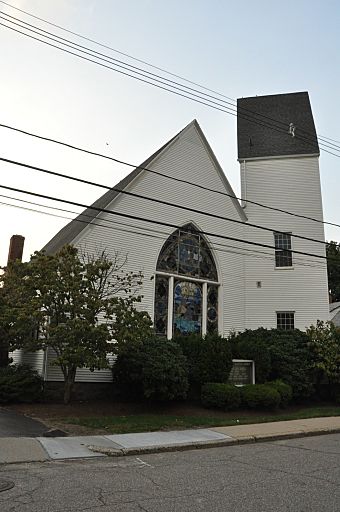Myrtle Baptist Church Neighborhood Historic District facts for kids
Quick facts for kids |
|
|
Myrtle Baptist Church Neighborhood Historic District
|
|

The Myrtle Baptist Church on Curve St.
|
|
| Location | Roughly Curve St. and Prospect St., Newton, Massachusetts |
|---|---|
| Area | 6.5 acres (2.6 ha) |
| Built | 1874 |
| Architect | Spence, George W.; McGraw, J.G. |
| Architectural style | Italianate, Second Empire, Queen Anne |
| MPS | Newton MRA (AD) |
| NRHP reference No. | 08001178 |
| Added to NRHP | December 11, 2008 |
The Myrtle Baptist Church Neighborhood Historic District is a special area in West Newton, Massachusetts. It's important because it shows the history of the African-American community there. This district includes all of Curve Street, where the famous Myrtle Baptist Church stands. It also has a few buildings on nearby Auburn and Prospect Streets. This historic area was officially added to the National Register of Historic Places in 2008.
Contents
A Look at History: The Myrtle Baptist Church Neighborhood
This neighborhood, especially Curve Street, has been a central spot for Newton's African-American community since around 1870. It's the only area like it in the city that still looks much like it did long ago. Other parts were changed to build the Massachusetts Turnpike.
The Heart of the Community: Myrtle Baptist Church
The Myrtle Baptist Church became the main focus of this neighborhood. It was first built in 1875 from wood. After a fire, it was rebuilt in 1898. Many people in the community worked in the nearby railroad yards. These jobs helped families live and grow in the area. Some houses on busy Curve Street have even stayed with the same families for many generations.
What You'll Find in the District
The historic district has one church, one business building, and twenty-two homes. Most of these houses were built between the 1880s and 1929. They are usually close to the street on small plots of land.
Types of Homes You Can See
Most of the homes are for one family. However, there is one large house built in the Second Empire style. This house was changed into several apartments. You can also find a few duplexes, which are homes for two families. There is even one triple-decker, a building with three apartments, one on each floor.
The houses show many different popular styles from that time. They are built in a way that was common for regular homes, not fancy mansions.
The Unique House at 15-29 Prospect Street
One of the most interesting houses is at 15-29 Prospect Street. This is the large Second Empire style house that was divided into apartments. It was moved to this area sometime in the 1800s. By the early 1900s, it was already split into apartments. This house still has many of its original cool features. These include decorative brackets under the roof, arched windows on the roof, and a fancy small tower called a cupola.
See also
 | Valerie Thomas |
 | Frederick McKinley Jones |
 | George Edward Alcorn Jr. |
 | Thomas Mensah |



